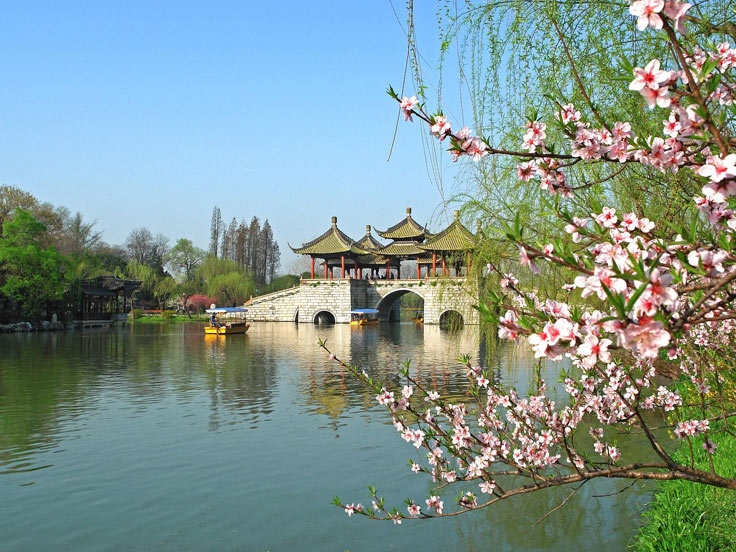240-Hour Visa-Free Transit in China
China is implementing a 10-day (240 hours) visa-free transit policy. The transit program allows visitors who have existing flight bookings from China to a third country (region) to snag a visa on arrival at a Chinese airport (port) and stay for 10 days before departure. Hong Kong, Macao and Taiwan all count as third destinations.
Passport holders of 54 countries, including the United States and the United Kingdom, can enter visa-free through any of the 60 open airports (ports) in 24 provincial regions, covering popular tourist cities like Beijing, Shanghai, Xi’an, Chengdu and Guangzhou.
Read more about 240-Hour Visa-Free Transit in China.
Meanwhile, citizens from 38 countries can enter China visa-free for up to 30 days.
Day 1 Shanghai - Nanjing (by Bullet Train)
The Nanjing Museum currently holds 400,000 collections, including the world famous full size suit of 'jade clothes sewn with golden thread'.
The Qinhuai River is the cradle of the ancient culture of Nanjing. Enjoy the old style buildings and cultural sites along the river banks and feel its unique charm.
The Confucius Temple was originally established in the Song Dynasty, it is the place to worship and consecrate Confucius, the great philosopher and educator of ancient China.
Day 2 Nanjing - Yangzhou (by automobile)
Built in late Qing Dynasty, the He Garden was constructed in traditional Chinese style with western style ornaments. The 1500-meter long winding corridor is a unique highlight of the garden.
The Han Dynasty Tomb is the mausoleum of the Emperor Liu Xu of Western Han Dynasty. A large number of cultural relics were unearthed from the large-scale and well-structured tomb, such as silverware, bronze ware, jade ware, and pottery.
Day 3 Yangzhou - Zhenjiang - Suzhou (by automobile)
Wander through the Xijindu Ancient Street, a well-preserved street featuring a collection of historical buildings and historical sites.
Day 4 Suzhou - Hangzhou (by Bullet Train)
The Lingering Garden is known as one of the “Four Famous Classic Gardens” in China, and was listed as the World Cultural Heritage by UNESCO in 1997. The garden was built in the year of 1593. As a classic example of the refined art of gardening in ancient China, it highlights the delicate courtyard, magnificent halls, the green mountain, clear water and luxuriant trees.
The Surging Wave Pavilion was built in 1045 AD. Being the oldest extant garden in Suzhou, it has retained its original feature of "luxuriant plants, tall mountain, and expansive waters". Its natural scenery and simple design have earned the fame of "a mountain forest in urban surroundings".
The Master of Nets Garden (built in 1174 A.D.) is an outstanding example of the small gardens in Suzhou. The garden covers only 0.6 hectare, small in size but very elegant. It keeps the traditional appearances of the time-tested and well-known residence in Suzhou, and it features the landscape garden in combination with the living quarters. The garden was inscribed on the World Heritage List by UNESCO in 1997.
Optional night tour in the Master of Nets Garden: The Master of Nets Garden (built in 1174 A.D.) provides an atmosphere of peace and calm in the evening. Inside the small and exquisite garden, the yellowish lights and red lanterns outline the pavilions and chambers built by water, displaying the nobleness and elegance of the Chinese garden. Besides, visitors can enjoy performances such as Kunqu Opera and Suzhou Pingtan in the garden. The night garden tour is available during mid-March to mid-November.
Day 5 Hangzhou
The Six Harmonies Pagoda is a masterpiece of ancient Chinese architecture. You can get a panoramic view of the Qiantang River on the very top.
The Traditional Chinese Medicine Museum will amaze you at the profound history and culture of Chinese medicine.
The Qinghefang Historical Street has been the most flourished street in the city since the ancient time. Hangzhou’s century-old shops are all located in this area.
- Private English-speaking tour guide
- Private air-conditioned van
- Land transfers between airport and hotel
- Entrance ticket as listed
- Lunch as listed
- Hotel accommodation with breakfast
- Bullet train tickets as listed
- Service charge & government taxes
- Flight ticket
- Personal expenses such as laundry, drinks, fax fee, phone bills, optional activities
- Gratuities for guides and drivers
- China Visa
- Travel insurance





































































